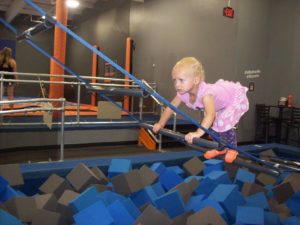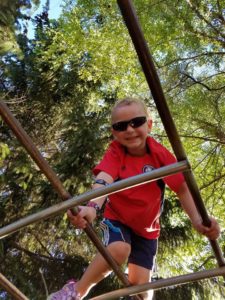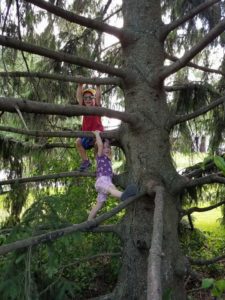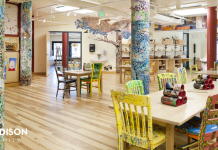I’m a planner. Always have been, but when I became a parent, I quickly learned that I couldn’t plan everything (even when I tried). I’ve always enjoyed researching, reading different perspectives on parenting, and I know that being a helicopter parent won’t do my kids any favors. With all the unpredictable things that can happen, it is so hard to keep myself from saying, “be careful!” to everything my kids do.
There are many reasons to encourage riskier play and more independence for children of all ages. It helps them learn to navigate risks on their own (in a safe environment), to trust their own judgement and instincts, gain confidence, and build fine and gross motor skills (see this NPR article for more details). I love the idea of adventure playgrounds and playing with “found objects” and the creativity that can come from those experiences, but given my anxiety, it is hard to not worry. So, I’ve learned to take things one step at a time.
The first step, for me, was to try to cut down on the amount of times I say, “be careful!” I’ve seen kids (mine included) climbing well, and when a well-meaning adult utters those words, they suddenly over-focus on their feet and hands and start to stumble or give up completely. There are many phrases to use instead, many of which are more helpful in the end goal. Here are a few of my favorites:
• Do you feel stable? My kids love to build, so we talk about the stability of their creations all of the time. When they apply this to their own bodies, it helps them to think about what they are doing without eroding their confidence.
• Please use the railing/look in front of you. Instead of telling my three-year old to be careful on the stairs, giving direct instruction as to what I specifically want her to do is more informative and conveys what behaviors I’m wanting to see. This applies to many situations (biking down the sidewalk, running in a crowded area…), but all serves the same purpose.
• I like how you think about where you are moving. Encouraging thoughtful and planned actions can be helpful to let them know that it is good to plan out your moves and be careful, but that they can do that on their own and don’t always need my direct instruction. This seems to help balance out all of the times where they do get direct instruction.
• Be gentle. When interacting with pets or other kids, what I really want my kids to do is to be gentle with the animal or with the other kids. My kids have little experience with pets, so they sometimes need reminders to have soft touches with animals in order to not spook the animal and to have it be a pleasant experience all around.

• Stay focused on what you are doing. Sometimes my kids start to climb and get distracted. Reminding them to focus on what they are doing seems to help get them back on track and not undermine their confidence.
These are just a few of the many phrases that can be used, but these have worked well for me. It is really difficult to break the habit, but with some practice, it has become a little more natural.
Now my husband is the opposite of me. He rarely has the urge to mutter, “be careful!” to the kids and is far more willing to let them climb the highest tree around at any age. Having his support has been very helpful as well, even if I feel that I need to balance out his free-range attitude sometimes. It is helpful to have someone else to bounce judgments off of and encourage me to let some of the concerns go.

Finally, one hurdle that I still have to maneuver around is some of the other parents’ looks. Kids these days have so few opportunities on normal playgrounds to engage in some risky play, so I do let my kids engage in some non-traditional play. For example, when my son was four, he saw some older kids climb on top of the monkey bars and crawl across the top. He was determined to do it as well. Our rule was, if you can get up there on your own, you can do it, and sure enough, he did. I definitely got some looks from other parents, but my son was so proud of himself, and it really helped to improve his climbing skills and confidence. I’ve learned that this can trump the looks from others, and I’m ok with that.
















